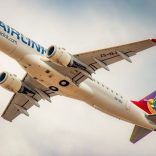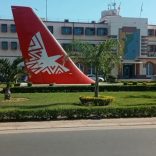Mozambique to roll out 10-year residence visa for $5 million-plus investors
Portugal and Angola are exceptions to the loss of tourism competitiveness of Portuguese-speaking countries, Mozambique included

File photo: Macauhub
Most Portuguese-speaking countries have fallen in the index of the recently published Travel and Tourism Competitiveness Report, with the exception of Portugal and Angola. [Access the full report HERE]
In the biennial report prepared by the World Economic Forum, Portugal continued the trend of previous years, rising two positions compared to 2017, to 12th place, among 140 nations around the world, and was the highest ranked Portuguese-speaking country.
Among the various groups of factors considered, Portugal scored best in infrastructure and natural and cultural resources (15th in both) and lowest in business (31st).
Portugal receives 21.2 million tourists per year, who provide estimated revenues of US$17.11 billion.
In the index led by Spain, France and Germany, the second best-positioned Portuguese-speaking country is Brazil, in 32nd place, a drop of five places compared with 2017.
The main attractions of the Brazilian tourism sector are the country’s natural and cultural resources (6th best in the world), but the overall score is pulled back by the business environment (31st place).
Brazilian tourism revenues are estimated at US$5.8 billion in the report, with the country receiving nearly 6.59 million tourists annually.
Cabo Verde also fell back in this year’s edition of the Travel and Tourism Competitiveness Report, by five positions, to 88th overall.
The Cape Verdean tourism sector, the “driver” of the archipelago’s economy ($ 667 million in annual revenues), has its strengths in tourism and travel policies (63rd place overall) and its weaknesses in cultural and natural resources (135th place). general place).
Mozambique also retreated five positions from 122nd to 127th, with the business environment penalising it and natural and cultural resources the biggest advantage (99th overall position).
Mozambican tourism revenues are estimated at just US$150.5 million, with the country receiving 1.48 million tourists annually.
Angola, which has been announcing its focus on tourism as a way of supporting the diversification of the economy, managed to move out of the penultimate place it had in 2015 in the index prepared by the World Economic Forum (the country was not included in the 2017 study).
Angola appears this year in 134th position, and the most favorable group of factors were natural and cultural resources (124th overall) and the worst was the business environment (133rd overall).
Angolan tourist revenues are estimated at US$880.4 million, although the country receives only 261,000 tourists annually.












Leave a Reply
Be the First to Comment!
You must be logged in to post a comment.
You must be logged in to post a comment.